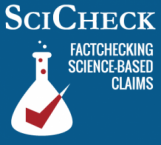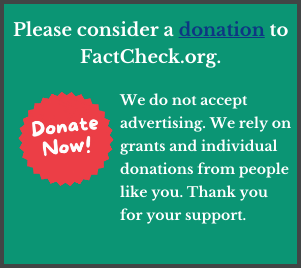Yale Preprint Recorded Patient Experiences, Did Not Demonstrate Vaccines Cause New Syndrome
SciCheck Digest
A preprint on a Yale-based study described chronic symptoms self-reported after COVID-19 vaccination by 241 members of an online group. The paper, which has not been peer-reviewed, did not show how common these symptoms are in the general population, nor whether vaccinations caused them — limitations popular online posts did not make clear.

Full Story
Some people experience side effects following COVID-19 vaccination, but they are generally short-lived. There are well-established serious side effects that can occur due to COVID-19 vaccination, such as myocarditis, but these are rare.
COVID-19 vaccination lowers the risk of severe disease and death from COVID-19. Among people who get COVID-19, those who are vaccinated may have a reduced risk of developing long COVID.

A preprint of a study posted online Nov. 10 described symptoms and other characteristics of 241 members of an online group who reported that they “thought the vaccine had injured them,” referring to COVID-19 vaccines. The authors described this group of patients as having reported “post-vaccination syndrome.” Preprints are drafts of papers posted online that have not yet been peer-reviewed or published in scientific journals.
As we’ve written previously, a voluntary survey cannot be used to determine whether vaccines are safe, nor can it provide a representative look at people’s experiences, positive or negative, after vaccination.
“In the study, we are describing the experience of people who have a chronic syndrome that begins soon after the COVID-19 vaccination,” co-author Dr. Harlan Krumholz, a cardiologist and scientist at Yale University, told us via email. “Since we do not know the cause, we labeled it a post-vaccination syndrome. We described it like that because that’s the timing of it.”
The participants, who were predominantly white women, reported various symptoms that they believed resulted from vaccine injury, most commonly exercise intolerance, excessive fatigue, numbness, brain fog and neuropathy. They said their symptoms started a median of three days after getting vaccinated, and they filled out the survey a median of 595 days after vaccination.
Online posts may give the misleading impression that researchers have determined that the COVID-19 vaccines caused a new syndrome. “It’s Called ‘Post-Vaccine Syndrome’ And It’s Real!” reads the text accompanying an episode of the Jimmy Dore Show posted on Facebook by the show’s account. Jimmy Dore, who hosts the eponymous web show, has a history of making misleading or false statements about vaccination and other topics.
To be clear, the preprint assigns the label “post-vaccination syndrome” to patients’ self-reported symptoms, but it does not establish the causes of the symptoms or their prevalence among vaccinated people.
In the episode, Dore replayed a popular video previously posted on YouTube by nurse educator John Campbell, who also has a history of spreading misinformation about vaccines. Campbell opened his video by welcoming his audience and saying, “Researchers from Yale in the United States have identified a post-vaccine syndrome occurring after the COVID vaccinations.” He did not clarify that the syndrome is a collection of symptoms that were not necessarily caused by the vaccines.
Campbell went on to give AIDS as another example of a syndrome, without stating that AIDS is now a well-characterized disease with a clear cause, while “post-vaccination syndrome” is a loosely defined phenomenon whose cause or causes are unclear.
He then listed percentages of participants in the study who reported each symptom, without making clear that these numbers did not mean a high proportion of all vaccinated people would experience the symptoms.
Physician-scientists who were not involved in the study emphasized what it cannot show.
“We cannot draw conclusions about the causation of the symptoms reported in this study based on the study design,” Dr. Linda Geng, an internal medicine doctor and co-director of the Post-Acute COVID-19 Syndrome Center at Stanford University, told us in an email. “Vaccines can be life-saving and it is important that we remember their benefits for public health and the broader population as we continue to research and better understand their potential complex effects in subsets of individuals.”
“The results of the preprint would only potentially (if peer-reviewed and published) be applicable to patients who self-identify as having post-vaccination syndrome,” Dr. Alan Kwan, a cardiologist at Cedars-Sinai, told us in an email. “It should not be extrapolated to any other groups including all vaccination patients, and does not address any questions of mechanism, or causality.”
Dr. Jennifer Frontera, a neurocritical care specialist at NYU Langone Health, expressed doubt that COVID-19 vaccinations caused the symptoms described in the preprint. She described the results of her own research into neurological events after vaccination, which only showed rare links between the Johnson & Johnson vaccine and neurological conditions. “People’s symptoms are real, right? But they are probably related to something else,” she said.
Study Describes Symptoms of an Online Patient Group
The study participants were all members of an online support and research community for people affected by COVID-19, called Kindred. Krumholz co-founded a company that developed software used in the Kindred platform to help people share their medical records.
The first users of the platform were people with long COVID, Krumholz explained, and the community subsequently “was expanded to include those who were reporting a chronic syndrome that they associated with vaccination.” He added that the two groups of patients “were experiencing very similar symptoms, and the challenges that they were facing were also similar.” The LISTEN study, some of which was described in the preprint, includes both of these groups of patients.
Survey questions prompted the participants to consider whether they had around 100 different health conditions “as a result of vaccine injury.” The most common problems attributed to vaccination — reported in half or more of the participants — were exercise intolerance, excessive fatigue, numbness, brain fog, neuropathy, insomnia, palpitations, muscle or body aches, tinnitus or humming in ears, headache, burning sensations, and dizziness.
“In this study, individuals who reported [post-vaccination syndrome] after covid-19 vaccination had low health status, high symptom burden, and high psychosocial stress despite trying many treatments,” the researchers concluded in the preprint. “There is a need for continued investigation to understand and treat this condition.”
The researchers ultimately plan to analyze not only data on symptoms and medical history, but also some blood and saliva samples.
“We are planning studies that will correlate what people are experiencing with biological signals that may indicate some underlying cause,” Krumholz said. “There are so many questions. Many of these people have been dismissed by the healthcare system. We are continuing to try to find answers.”
Definition and Causes of ‘Post-Vaccination Syndrome’ Are Unclear
Krumholz indicated that the definition of the syndrome is a work in progress. “If I were to put forth the definition, I would say that it should be a syndrome that begins within a week of the vaccination and persists for over a month. But it would be important to bring people together, including those who were affected, to develop a definition that is useful and acceptable to those affected.”
“The definition of post-vaccine syndrome is murky and not yet a formal clinical diagnosis, and it is challenging to know who may fall into this category as the scientific knowledge about post-COVID and post-vaccine effects evolves,” Geng said.
“As the authors point out, a causal link between vaccination and what is called PVS cannot be established from these data, although the reported temporal relationship between vaccination and symptom onset is suggestive,” Katherine Yih, an epidemiologist at Harvard Pilgrim Health Care Institute, told us in an email. However, she added that the lengthy period between vaccination and filling out the survey “might make recall and the timing of symptom onset uncertain.”
“I just don’t like people calling something a syndrome, post-vaccination syndrome,” Frontera said. “I feel like that’s unfortunate, because it really kind of implies causality.”
Frontera said that the symptoms described in the paper are often associated with treatable mood disorders, like depression or anxiety. She added that the group reported many preexisting health problems and social stressors, including loneliness and isolation.
Frontera referenced her own work on long-term outcomes after severe COVID-19, which involved conducting phone interviews with patients one year after hospitalization. She found that life stressors within the month prior to the phone interview were associated with prolonged COVID-19 symptoms and generally poor outcomes, such as worse depression, fatigue and sleep.
Geng said that the symptoms reported in the study “highly overlap with Long COVID.” The researchers excluded people from the study who reported that they had long COVID, Geng said, but “it is not always easy to know if the self-categorization is correct.”
There is no diagnostic test to determine if someone has long COVID, she explained, and people may get COVID-19 and be unaware of it. Around a third of the study participants reported having had COVID-19 at least once. “Depending on the extent of their medical evaluation, it is also possible there are other medical conditions that are causing these symptoms that may be missed or not yet diagnosed,” Geng said.
Vaccine Safety Studies Indicate Serious Adverse Events Are Rare
The Centers for Disease Control and Prevention and the U.S. Food and Drug Administration have not thus far found evidence of a cluster of chronic symptoms after vaccination similar to those described in the preprint.
The two agencies “are aware of reports in the Vaccine Adverse Event Reporting System (VAERS) and in the media of a wide range of long-lasting symptoms following COVID-19 vaccination (such as fatigue, headache, and difficulty concentrating),” a CDC spokesperson told us in an email, adding that these symptoms have also been reported with long COVID.
“However, to date, no unusual or unexpected patterns of long-lasting symptoms or health problems following vaccination have been linked to vaccination by COVID-19 vaccine safety monitoring systems,” the spokesperson said.
While some of the symptoms described in the preprint — such as fatigue, muscle aches and headache — overlap with symptoms commonly experienced shortly after vaccination, it is not common for these symptoms to become chronic. Data from the clinical trials for the mRNA COVID-19 vaccines indicate that common post-vaccination symptoms resolved within days on average. Safety monitoring after the COVID-19 vaccine rollout continued to indicate that vaccine side effects were generally short-lived.
Still, some researchers left open the possibility that there are yet-undetected vaccine adverse events.
“I don’t want to impugn the surveillance systems used by the CDC but it is possible that they are missing this syndrome,” Krumholz said. “What I can say for sure is that there are many people who are suffering from a chronic syndrome that is very debilitating and began after the vaccination. It is possible that it is a coincidence – but it is important that we follow the science and discover the cause, wherever that leads us, so we can develop strategies to help these people.”
Kwan said in an interview that vaccine safety monitoring databases, such as VAERS, “are more easily set up to measure things like myocarditis and less set up to measure symptoms like fatigue or the things that were asked in this survey.”
He co-authored a study based on medical records indicating a possible link between COVID-19 vaccination and postural orthostatic tachycardia syndrome, or POTS. POTS symptoms, such as dizziness and palpitations, overlap with those reported in the preprint. Kwan’s study found that people were more likely to be diagnosed with POTS in the 90 days after vaccination than in the 90 days before vaccination. But it also found a much more pronounced link between POTS and COVID-19, indicating that vaccination could still ultimately reduce the risk of POTS even if the link between vaccination and POTS proved to be causal.
“I personally believe there are patients out there who had adverse reactions to the vaccine and were likely injured by the vaccine and likely suffer long-term medical symptoms from it,” Kwan said. ”I think it’s unlikely that it’s a significant number of patients. It would not discourage me from encouraging people to receive their vaccinations.”
Yih co-authored a study using another vaccine safety monitoring system, Vaccine Safety Datalink, to attempt to detect unexpected COVID-19 vaccine adverse events. She said that the study detected a link between the mRNA COVID-19 vaccines and conditions such as muscle aches, headache, malaise, fatigue and palpitations — but that it’s difficult to differentiate known, common short-term side effects from long-term problems.
“Specially designed studies focusing on [post-vaccination syndrome] will be needed to more fully characterize and understand this outcome and its relationship with vaccination,” she said.
The Impact of Vaccine Information and Misinformation
The widespread dissemination of vaccine information, misinformation and disinformation can influence people’s experiences of vaccine side effects, complicating the study of people’s experiences after vaccination.
Much as the placebo effect can cause someone to experience improvements simply due to the belief they are receiving a medical intervention, a related phenomenon called the nocebo effect can cause people to experience side effects when they have only received a placebo.
Geng pointed to studies that indicate vaccine hesitancy, negative expectations or negative prior experiences with vaccination can influence the COVID-19 vaccine side effects people have, which she said “may be of interest and have some relevance to this topic at hand.”
She also cited a study exploring vaccine side effects in the placebo arms of the COVID-19 vaccine clinical trials that found that about a third of participants experienced systemic side effects after each dose. The most common side effects were headache and fatigue.
This was a lower rate of side effects than reported in the people who got a vaccine, but nonetheless indicates a substantial nocebo response, the researchers said. They wrote that headache, fatigue, malaise and joint pain “seem to have been particularly associated with nocebo.”
On the other side of the coin, narratives about vaccines and the prevalence of anti-vaccine sentiments may also marginalize people who experience health problems following vaccination. These people may be “lumped into this general anti-vax sentiment, which I don’t think a lot of them are,” Kwan said.
Kwan added that it’s important to acknowledge that there are people who may have “symptoms or injuries related to vaccine administration, and that there needs to be a space for them within the medical community to receive meaningful and effective care and to be heard.”
Editor’s note: SciCheck’s articles providing accurate health information and correcting health misinformation are made possible by a grant from the Robert Wood Johnson Foundation. The foundation has no control over FactCheck.org’s editorial decisions, and the views expressed in our articles do not necessarily reflect the views of the foundation.
Sources
“Getting Your COVID-19 Vaccine.” CDC website. Updated 29 Sep 2023.
“Selected Adverse Events Reported after COVID-19 Vaccination.” CDC website. Updated 12 Sep 2023.
“COVID-19 Vaccine Effectiveness Update.” CDC website. 31 Aug 2023.
“Long COVID or Post-COVID Conditions.” CDC website. 20 Jul 2023.
Krumholz, Harlan M. et al. “Post-Vaccination Syndrome: A Descriptive Analysis of Reported Symptoms and Patient Experiences After Covid-19 Immunization.” medRxiv.10 Nov 2023.
Yandell, Kate. “COVID-19 Vaccines Save Lives, Are Not More Lethal Than COVID-19.” FactCheck.org. 6 Nov 2023.
Krumholz, Harlan. Email to FactCheck.org. 10 Dec 2023.
The Jimmy Dore Show. “It’s Called ‘Post-Vaccine Syndrome’ And It’s Real!” Facebook. 29 Nov 2023.
Fichera, Angelo. “Video Doesn’t Show Biden Hosting ‘Black Face Skit.’” FactCheck.org. 17 Jul 2020.
Jones, Brea. “FDA-Approved ‘Electronic Pill’ Isn’t Evidence That COVID-19 Vaccine ‘Microchip’ Conspiracy Is ‘Proven.’” FactCheck.org. 26 May 2022.
Jones, Brea. “‘Liberal World Order’ Is Decades-Old Term Misinterpreted by Social Media Posts.” FactCheck.org. 8 Jul 2022.
Jones, Brea. “Posts Distort Chinese Research Creating Fragment of Monkeypox Viral Genome.” FactCheck.org. 29 Jul 2022.
Dr. John Campbell. “New syndrome.” YouTube. 19 Nov 2023.
Geng, Linda. Email to FactCheck.org. 6 Dec 2023.
Kwan, Alan. Interview and email with FactCheck.org. 5 and 13 Dec 2023.
Frontera, Jennifer. Interview with FactCheck.org. 6 Dec 2023.
Frontera, Jennifer A. et al. “Neurological Events Reported after COVID‐19 Vaccines: An Analysis of Vaccine Adverse Event Reporting System.” Annals of Neurology. 2 Mar 2022.
“The LISTEN Study.” Hugo Health Kindred website. Accessed 15 Dec 2023.
Yih, Katherine. Email with FactCheck.org. 13 Dec 2023.
Frontera, Jennifer A. et al. “Life Stressors Significantly Impact Long-Term Outcomes and Post-Acute Symptoms 12-Months after COVID-19 Hospitalization.” Journal of the Neurological Sciences. 5 Nov 2022.
“Caring for People with Long COVID.” CDC website. Updated 28 Sep 2023.
Polack, Fernando P. et al. “Safety and Efficacy of the BNT162b2 mRNA Covid-19 Vaccine.” New England Journal of Medicine. 31 Dec 2020.
Baden, Lindsey R. et al. “Efficacy and Safety of the mRNA-1273 SARS-CoV-2 Vaccine.” New England Journal of Medicine. 4 Feb 2021.
Rosenblum, Hannah G. et al. “Safety of mRNA Vaccines Administered during the Initial 6 Months of the US COVID-19 Vaccination Programme: An Observational Study of Reports to the Vaccine Adverse Event Reporting System and v-Safe.” The Lancet Infectious Diseases. 7 Mar 2022.
Kwan, Alan C. et al. “Apparent Risks of Postural Orthostatic Tachycardia Syndrome Diagnoses after COVID-19 Vaccination and SARS-Cov-2 Infection.” Nature Cardiovascular Research. 12 Dec 2022.
Lovelace Jr., Berkeley. “POTS, a Debilitating Heart Condition, Is Linked to Covid and, to a Lesser Degree, Vaccines.” NBC News. 12 Dec. 2022.
Yih, W. Katherine et al. “A Broad Assessment of Covid-19 Vaccine Safety Using Tree-Based Data-Mining in the Vaccine Safety Datalink.” Vaccine. 16 Dec 2022.
MacKrill, Kate. “Impact of Media Coverage on Side Effect Reports from the COVID-19 Vaccine.” Journal of Psychosomatic Research. 17 Nov 2022.
Hoffman, Yaakov S. G. et al. “Vaccine Hesitancy Prospectively Predicts Nocebo Side-Effects Following COVID-19 Vaccination.” Scientific Reports. 5 Dec 2022.
Schäfer, Ingmar et al. “Expectations and Prior Experiences Associated With Adverse Effects of COVID-19 Vaccination.” JAMA Network Open. 27 Mar 2023.
Haas, Julia W. et al. “Frequency of Adverse Events in the Placebo Arms of COVID-19 Vaccine Trials: A Systematic Review and Meta-Analysis.” JAMA Network Open. 18 Jan 2022.
This article has been archived for your research. The original version from FactCheck.org can be found here.



